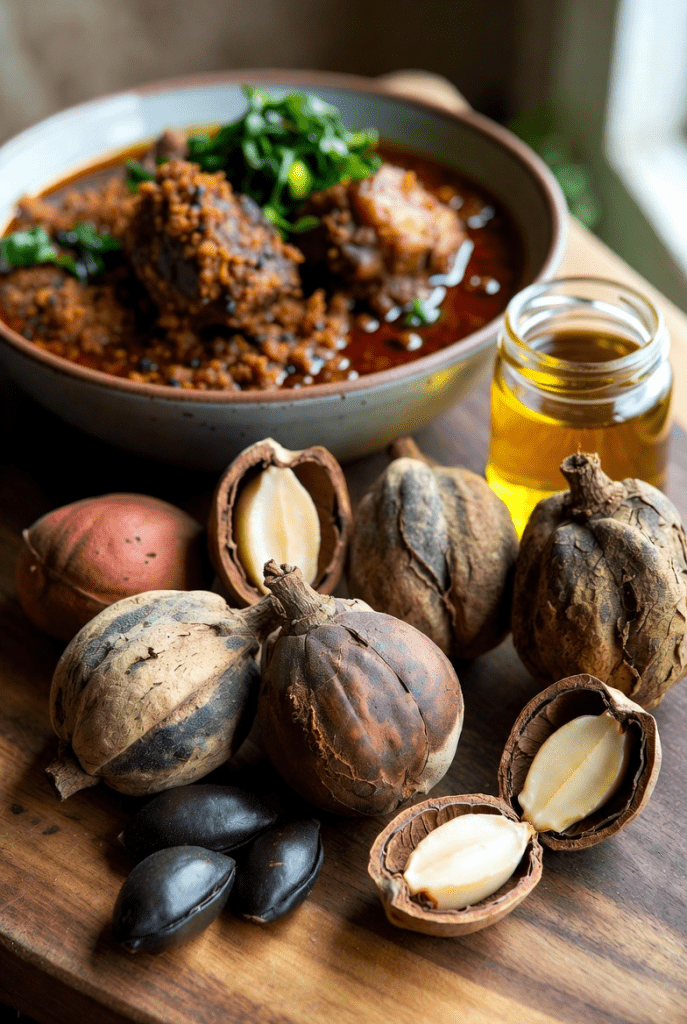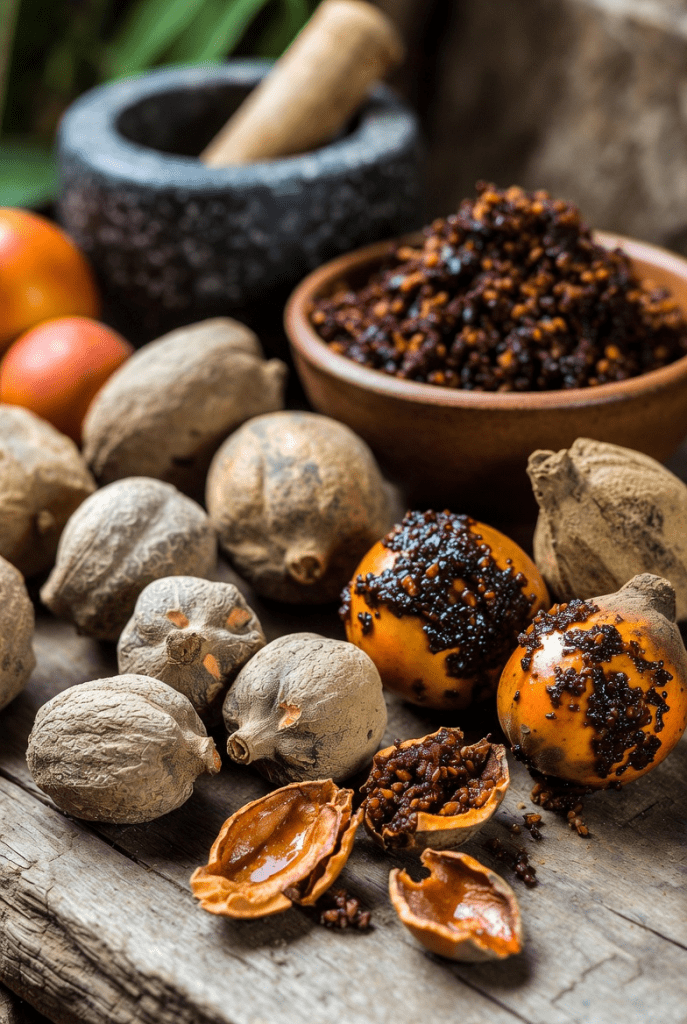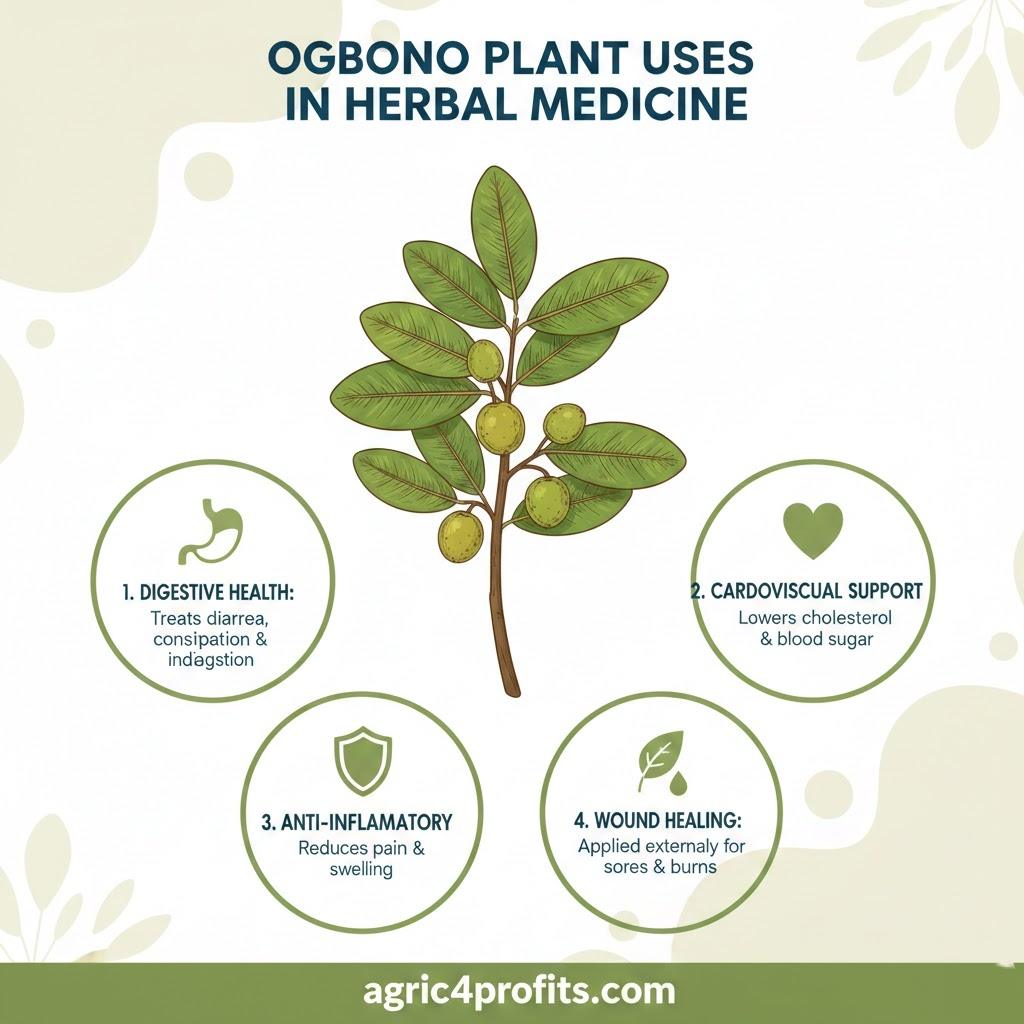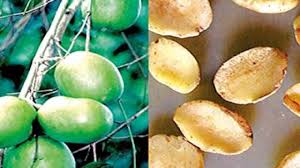Ogbono, scientifically known as Irvingia gabonensis and commonly called bush mango or wild African mango, is a tropical tree native to West and Central Africa, especially valued in Nigeria and surrounding regions. For centuries, different parts of the Ogbono plant—particularly the seeds, bark, and leaves—have played important roles in traditional African herbal medicine. The seeds are the most widely used part, prized for both their nutritional density and therapeutic properties.
Ogbono seeds are rich in healthy fats, soluble fiber, protein, minerals, and antioxidants. They are traditionally employed to support weight management, regulate blood sugar, promote heart health, improve digestion, boost immunity, reduce inflammation, enhance skin health, and aid fertility. Modern interest in natural remedies continues to highlight Ogbono as a promising plant for managing metabolic, cardiovascular, and inflammatory conditions.
Traditional Applications of Ogbono in Herbal Medicine

1. Wound Healing: Seeds are crushed into a paste or poultice and applied to promote faster healing and reduce inflammation.
2. Immune Support: Seed extracts and decoctions are consumed to strengthen immunity and combat general weakness and infections.
3. Appetite Control and Weight Management: Traditionally eaten to reduce hunger and prevent overeating.
4. Blood Sugar Regulation: Used to help stabilize blood glucose levels in people managing diabetes.
5. Treatment of Diarrhea: Seeds or bark preparations help firm stools and regulate bowel movements.
Ogbono Seed Oil for Skin Health
1. Moisturization: Rich fatty acids deeply hydrate and lock in moisture for dry skin.
2. Anti-Inflammatory Properties: Soothes irritations, redness, and inflamed skin conditions.
3. Anti-Aging Benefits: Antioxidants combat free radicals and reduce fine lines and wrinkles.
4. Healing Properties: Accelerates recovery from minor cuts, burns, and scars.
5. Acne Treatment: Non-comedogenic oil provides moisture without clogging pores.
Here is a relevant image of Ogbono seed oil applied for skin care:
Benefits of Ogbono in Cardiovascular Health
1. Cholesterol Regulation: Lowers LDL and total cholesterol while raising beneficial HDL.
2. Promotes Healthy Blood Pressure: Potassium and magnesium content help maintain normal blood pressure.
3. Omega-3 Fatty Acids: Reduce inflammation and prevent arterial blockages.
4. Blood Circulation Improvement: Vitamin E supports better oxygen and nutrient delivery.
5. Reduces Risk of Atherosclerosis: Helps prevent plaque buildup in arteries.
Here is an illustrative image related to heart-healthy Ogbono benefits:
Ogbono Plant’s Role in Boosting Immunity
1. Rich in Antioxidants: Neutralizes free radicals and protects immune cells.
2. Immune-Boosting Vitamins: Supplies vitamins A, C, and E essential for immune function.
3. Strengthens White Blood Cells: Zinc and selenium support white blood cell production.
4. Antiviral and Antibacterial Properties: Helps prevent and fight common infections.
5. Supports Gut Health: Prebiotic fiber nourishes beneficial gut bacteria linked to immunity.
Anti-inflammatory Properties of Ogbono in Herbal Medicine
1. Reduces Inflammation: Polyphenols and omega-3s lower chronic inflammation markers.
2. Joint Pain Relief: Eases pain and swelling in arthritis and joint conditions.
3. Aids in Recovery from Injury: Speeds healing by reducing tissue inflammation.
4. Inflammation-Related Disease Prevention: May lower risk of heart disease, diabetes, and cancer.
5. Natural Pain Reliever: Offers relief from inflammation-induced pain.
Ogbono as a Natural Remedy for Diabetes
1. Blood Sugar Regulation: Soluble fiber slows carbohydrate absorption and prevents spikes.
2. Insulin Sensitivity: Improves how the body uses insulin effectively.
3. Appetite Control: Promotes fullness and helps prevent overeating.
4. Low Glycemic Index: Releases sugar slowly into the bloodstream.
5. Anti-Inflammatory Properties: Reduces inflammation linked to diabetes complications.
Ogbono Plant’s Effectiveness in Bone Health
1. Rich in Calcium: Supports strong bones and helps prevent osteoporosis.
2. Enhances Bone Density: Magnesium contributes to increased bone strength.
3. Phosphorus Support: Essential for proper bone mineralization.
4. Vitamin D Absorption: Aids effective use of calcium and phosphorus.
5. Natural Anti-Inflammatory: Reduces joint and bone inflammation.
Read Also: Bedbugs: Description, Damages Caused, Control and Preventive Measures
Ogbono Plant Extracts for Managing Blood Pressure

1. High Potassium Content: Balances sodium and supports healthy blood flow.
2. Vasodilation Effects: Helps relax blood vessels and lower pressure.
3. Antioxidant Properties: Protects blood vessels from oxidative damage.
4. Low Sodium Content: Heart-friendly for hypertension management.
5. Reduces Cholesterol: Contributes to better overall cardiovascular health.
Scientific Evidence and Case Studies on Ogbono (Irvingia gabonensis)

1. Weight management and fat reduction: Clinical studies show that Irvingia gabonensis seed extract significantly reduces body weight, waist circumference, and body fat in overweight individuals.
2. Blood sugar and diabetes control: Research demonstrates improved fasting blood glucose, reduced insulin resistance, and better glycemic control in participants taking Ogbono seed extracts.
3. Cholesterol and lipid profile improvement: Multiple trials indicate significant reductions in total cholesterol, LDL cholesterol, and triglycerides, with increases in HDL cholesterol.
4. Anti-inflammatory and antioxidant activity: Laboratory and human studies confirm that Ogbono seeds reduce inflammatory markers and oxidative stress due to high polyphenol and flavonoid content.
5. Appetite suppression effects: Controlled studies report decreased appetite and increased feelings of fullness, linked to the gel-forming soluble fiber in the seeds.
Summary of Ogbono Plant Uses in Herbal Medicine
| Aspect | Description |
|---|---|
| Scientific Name | Irvingia gabonensis (bush mango / wild African mango) |
| Main Parts Used | Seeds (most common), bark, leaves |
| Key Nutritional Components | Soluble fiber, healthy fats, protein, antioxidants, minerals (calcium, magnesium, potassium) |
| Major Health Benefits | Weight management, blood sugar control, cholesterol reduction, heart health, anti-inflammatory, immune support, digestive health, skin care |
| Traditional Preparations | Soups/stews, seed powder, decoctions, poultices, seed oil |
| Common Uses in Modern Times | Supplements for weight loss, diabetes support, cardiovascular health |
| Safety Notes | Generally safe in food amounts; consult professional for therapeutic doses |
| Research Status | Supported by clinical trials for weight, glucose, and lipid benefits; ongoing studies |
Frequently Asked Questions
1. What is Ogbono and what part is mainly used in herbal medicine?
Ogbono (Irvingia gabonensis) is an African tree known as bush mango. The seeds are the primary part used for both nutritional and medicinal purposes.
2. How does Ogbono help with weight loss?
The high soluble fiber forms a gel in the stomach, promotes fullness, suppresses appetite, and may increase fat metabolism.
3. Can Ogbono seeds help manage diabetes?
Yes, they slow sugar absorption, improve insulin sensitivity, and help stabilize blood glucose levels.
4. Does Ogbono support heart health?
Yes, it helps lower bad cholesterol, reduce inflammation, regulate blood pressure, and improve circulation.
5. Is Ogbono seed oil good for the skin?
Yes, it moisturizes deeply, reduces inflammation, fights aging signs, heals minor wounds, and is suitable for acne-prone skin.
6. How does Ogbono benefit digestive health?
Its soluble fiber regulates bowel movements, acts as a prebiotic, protects the stomach lining, and helps relieve constipation and diarrhea.
7. Are there anti-inflammatory benefits of Ogbono?
Yes, bioactive compounds like polyphenols and omega-3 fatty acids help reduce chronic inflammation and joint pain.
8. Can Ogbono boost the immune system?
Yes, rich antioxidants, vitamins (A, C, E), zinc, and prebiotic fiber support immune function and help fight infections.
9. Is Ogbono safe for regular use?
Generally safe when consumed as food or in moderate supplement doses. Consult a healthcare provider before using it therapeutically, especially if pregnant, breastfeeding, or on medication.
10. Where is Ogbono commonly found and used?
It grows widely in West and Central Africa, with the highest traditional and commercial use in Nigeria, Cameroon, and Congo regions.
Do you have any questions, suggestions, or contributions? If so, please feel free to use the comment box below to share your thoughts. We also encourage you to kindly share this information with others who might benefit from it. Since we can’t reach everyone at once, we truly appreciate your help in spreading the word. Thank you very much for your support and for sharing!
Disclaimer: This article is for educational and informational purposes only. The health benefits described are based on scientific research and traditional knowledge. They ayre not a substitute for professional medical advice, diagnosis, or treatment. Always consult a healthcare professional before using any herb or natural remedy for medical purposes.
Read Also: How to Graft an Avocado Tree to Produce Avocado Fruit

